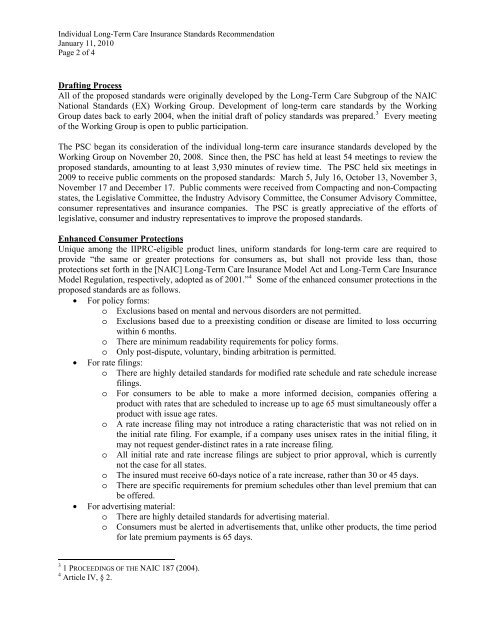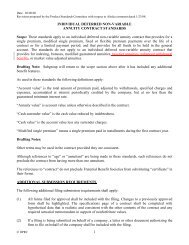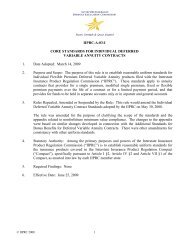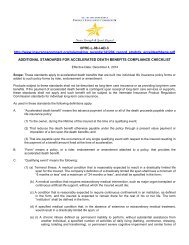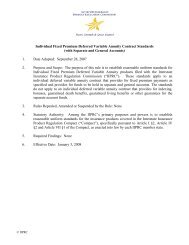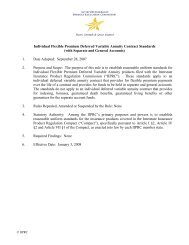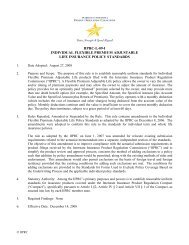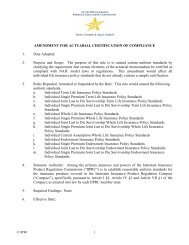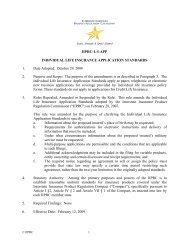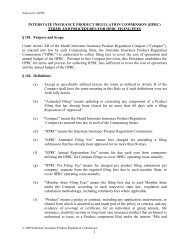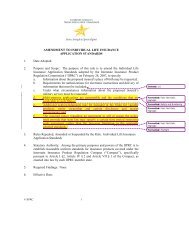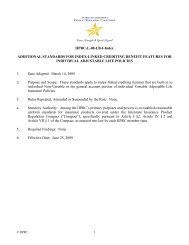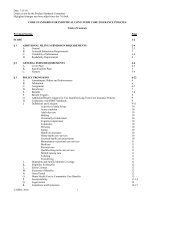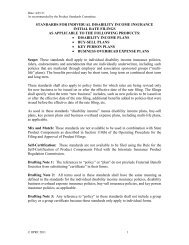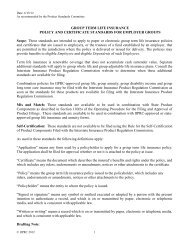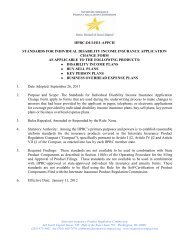Transmittal Memo from Product Standards Committee submitted 1 ...
Transmittal Memo from Product Standards Committee submitted 1 ...
Transmittal Memo from Product Standards Committee submitted 1 ...
Create successful ePaper yourself
Turn your PDF publications into a flip-book with our unique Google optimized e-Paper software.
Individual Long-Term Care Insurance <strong>Standards</strong> Recommendation<br />
January 11, 2010<br />
Page 2 of 4<br />
Drafting Process<br />
All of the proposed standards were originally developed by the Long-Term Care Subgroup of the NAIC<br />
National <strong>Standards</strong> (EX) Working Group. Development of long-term care standards by the Working<br />
Group dates back to early 2004, when the initial draft of policy standards was prepared. 3 Every meeting<br />
of the Working Group is open to public participation.<br />
The PSC began its consideration of the individual long-term care insurance standards developed by the<br />
Working Group on November 20, 2008. Since then, the PSC has held at least 54 meetings to review the<br />
proposed standards, amounting to at least 3,930 minutes of review time. The PSC held six meetings in<br />
2009 to receive public comments on the proposed standards: March 5, July 16, October 13, November 3,<br />
November 17 and December 17. Public comments were received <strong>from</strong> Compacting and non-Compacting<br />
states, the Legislative <strong>Committee</strong>, the Industry Advisory <strong>Committee</strong>, the Consumer Advisory <strong>Committee</strong>,<br />
consumer representatives and insurance companies. The PSC is greatly appreciative of the efforts of<br />
legislative, consumer and industry representatives to improve the proposed standards.<br />
Enhanced Consumer Protections<br />
Unique among the IIPRC-eligible product lines, uniform standards for long-term care are required to<br />
provide “the same or greater protections for consumers as, but shall not provide less than, those<br />
protections set forth in the [NAIC] Long-Term Care Insurance Model Act and Long-Term Care Insurance<br />
Model Regulation, respectively, adopted as of 2001.” 4 Some of the enhanced consumer protections in the<br />
proposed standards are as follows.<br />
• For policy forms:<br />
o Exclusions based on mental and nervous disorders are not permitted.<br />
o Exclusions based due to a preexisting condition or disease are limited to loss occurring<br />
within 6 months.<br />
o There are minimum readability requirements for policy forms.<br />
o Only post-dispute, voluntary, binding arbitration is permitted.<br />
• For rate filings:<br />
o There are highly detailed standards for modified rate schedule and rate schedule increase<br />
filings.<br />
o For consumers to be able to make a more informed decision, companies offering a<br />
product with rates that are scheduled to increase up to age 65 must simultaneously offer a<br />
product with issue age rates.<br />
o A rate increase filing may not introduce a rating characteristic that was not relied on in<br />
the initial rate filing. For example, if a company uses unisex rates in the initial filing, it<br />
may not request gender-distinct rates in a rate increase filing.<br />
o All initial rate and rate increase filings are subject to prior approval, which is currently<br />
not the case for all states.<br />
o<br />
o<br />
The insured must receive 60-days notice of a rate increase, rather than 30 or 45 days.<br />
There are specific requirements for premium schedules other than level premium that can<br />
be offered.<br />
• For advertising material:<br />
o There are highly detailed standards for advertising material.<br />
o Consumers must be alerted in advertisements that, unlike other products, the time period<br />
for late premium payments is 65 days.<br />
3 1 PROCEEDINGS OF THE NAIC 187 (2004).<br />
4 Article IV, § 2.


